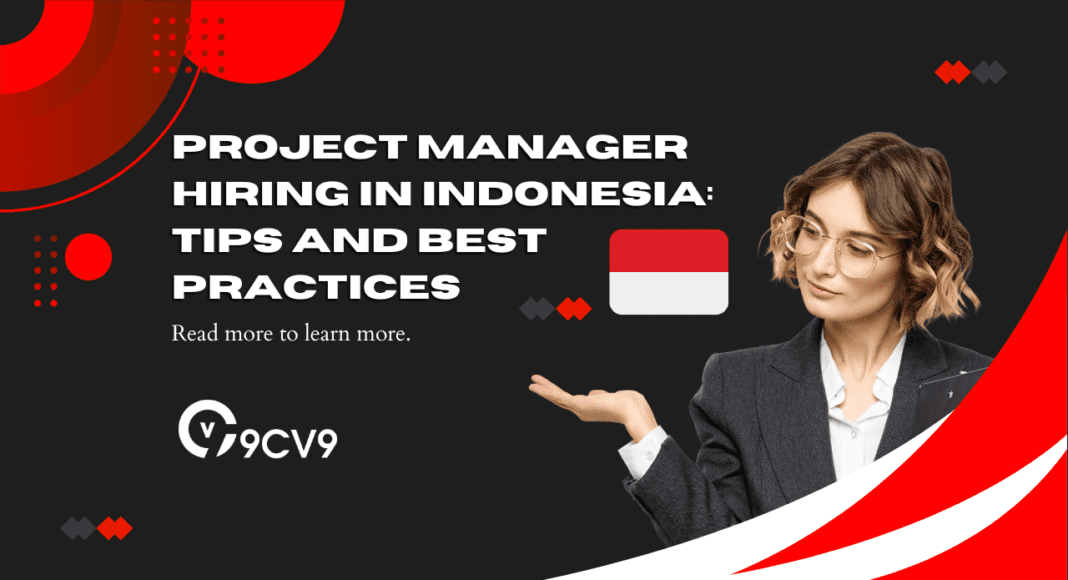Key Takeaways
- Understand the Indonesian project management landscape: Gain insights into the unique characteristics of the Indonesian market, such as the growth of project-based industries and the importance of cultural nuances.
- Craft compelling job descriptions: Create SEO-optimized job descriptions that accurately communicate responsibilities, qualifications, and growth opportunities to attract qualified project manager candidates.
- Evaluate cultural fit: Assess candidates’ adaptability and alignment with your organization’s culture to ensure a harmonious work environment and enhanced project outcomes.
Are you a business owner or a hiring manager looking to bolster your project management team in Indonesia?
As the demand for efficient project management continues to grow in this dynamic and diverse country, finding and hiring the right project manager is crucial for achieving successful outcomes and driving organizational success.
In this comprehensive guide, we will delve into the intricacies of project manager hiring in Indonesia, offering you valuable insights, tips, and best practices to navigate the recruitment process with confidence.
Whether you are an established multinational corporation or a startup aiming to expand your operations, understanding the unique aspects of hiring project managers in Indonesia is key to securing top talent and driving project success.
Before diving into the hiring process, it is essential to grasp the Indonesian project management landscape. Indonesia’s diverse economy spans various sectors, including manufacturing, construction, technology, and finance, each with its own unique project management requirements.
By understanding the specific industry dynamics and project management demands, you can tailor your hiring strategy to attract candidates with relevant expertise and experience.
To find the ideal project manager for your organization, you need to identify the key skills and qualifications that are essential for success in the Indonesian context.
While technical proficiency and industry-specific knowledge are crucial, it is equally important to consider the soft skills and leadership qualities that can drive project teams towards excellence.
We will explore the specific competencies that project managers should possess and offer guidance on evaluating candidates effectively.
A well-crafted job description serves as the first point of contact with potential candidates.
By creating an enticing job title, clearly outlining responsibilities and key deliverables, and highlighting the required qualifications and experience, you can attract qualified project managers who are genuinely interested in your organization.
We will provide valuable tips and examples to help you optimize your job descriptions and stand out in a competitive hiring landscape.
Once you have a compelling job description in hand, the next step is to source qualified project manager candidates.
We will explore various sourcing channels and strategies that you can leverage, including online job portals, professional networks, recruitment agencies, and local project management associations.
By casting a wide net and utilizing targeted approaches, you can maximize your chances of finding exceptional talent that aligns with your organization’s goals.
With a pool of potential candidates, it’s time to move on to the screening and interviewing stage.
This critical phase allows you to assess candidates’ qualifications, experience, and cultural fit.
We will delve into best practices for resume screening, conducting phone or video interviews, and designing effective in-person interviews that incorporate behavioral questions.
Additionally, we will explore the significance of reference checks and background verification to ensure you make informed hiring decisions.
Cultural fit plays a significant role in the long-term success of a project manager within your organization.
We will discuss the importance of understanding Indonesian workplace culture, identifying candidates’ adaptability and communication styles, and fostering diversity and inclusivity in your hiring process.
By considering cultural fit alongside qualifications, you can create a cohesive and harmonious project management team that thrives in the Indonesian business landscape.
Once you have selected the ideal project manager, it is crucial to provide them with a smooth onboarding experience.
We will guide you through the process of developing a comprehensive onboarding plan, introducing the new project manager to the team and company processes, and providing necessary training and mentorship.
Effective onboarding sets the foundation for a productive working relationship and ensures that the new project manager integrates seamlessly into your organization.
Retaining top project manager talent is vital to the long-term success of your projects and organization.
We will discuss strategies for creating a positive work environment and culture that fosters employee engagement and satisfaction.
Additionally, we will explore the importance of offering competitive compensation and benefits, providing growth and development opportunities, and promoting work-life balance and employee well-being.
By prioritizing the needs and aspirations of your project managers, you can foster loyalty and cultivate a high-performing team.
Hiring a project manager in Indonesia requires a thoughtful and strategic approach.
By understanding the unique dynamics of the Indonesian project management landscape, identifying key skills and qualifications, crafting compelling job descriptions, and implementing effective screening and interviewing processes, you can attract and select top talent.
Moreover, focusing on cultural fit, providing a smooth onboarding experience, and prioritizing employee retention will contribute to the long-term success of your projects and organization.
Join us as we explore the tips and best practices for project manager hiring in Indonesia, empowering you to build a strong project management team that drives success in this vibrant and rapidly evolving business environment.
Before we venture further into this article, we like to share who we are and what we do.
About 9cv9
9cv9 is a business tech startup based in Singapore and Vietnam, with a strong presence all over the world.
With over six years of startup and business experience, and being highly involved in connecting with thousands of companies and startups, the 9cv9 team has listed some important learning points in this overview of the guide on Project Manager Hiring in Indonesia: Tips and Best Practices.
If your company needs recruitment and headhunting services to hire top-quality employees, you can use 9cv9 headhunting and recruitment services to hire top talents and candidates. Find out more here, or send over an email to [email protected].
Or just post 1 free job posting here at 9cv9 Hiring Portal in under 10 minutes.
Project Manager Hiring in Indonesia: Tips and Best Practices
- Understanding the Indonesian Project Management Landscape
- Identifying the Key Skills and Qualifications
- Crafting a Compelling Job Description
- Sourcing Project Manager Candidates
- Screening and Interviewing Process
- Evaluating Cultural Fit
- Onboarding and Integration
- Retaining Top Project Manager Talent in Indonesia
1. Understanding the Indonesian Project Management Landscape

In recent years, Indonesia has emerged as a rapidly growing economy with a diverse range of sectors, each presenting unique project management challenges and opportunities.
Whether you are operating in manufacturing, construction, technology, finance, or any other industry, comprehending the Indonesian project management landscape is crucial for successful project execution.
Let’s delve into the key aspects and industries shaping project management in Indonesia.
- Manufacturing Sector: The manufacturing sector in Indonesia has witnessed significant growth, driven by domestic consumption and foreign investments. Project management plays a vital role in ensuring efficient production processes, optimizing supply chains, and implementing quality control measures. For instance, a project manager in the automotive industry may be responsible for overseeing the development and launch of a new vehicle model, coordinating activities between design teams, production units, and marketing departments.
- Construction Industry: Indonesia’s construction industry is experiencing a boom due to infrastructure development and urbanization. Large-scale projects such as airports, highways, ports, and commercial buildings require effective project management to meet deadlines, manage budgets, and adhere to strict safety regulations. A project manager in the construction industry might oversee a high-rise building project, coordinating with architects, contractors, and subcontractors to ensure seamless execution and timely completion.
- Information Technology (IT) and Software Development: The IT and software development sector in Indonesia has shown tremendous growth, fueled by a tech-savvy population and a burgeoning startup ecosystem. Project managers in this sector play a crucial role in overseeing software development projects, managing agile teams, and ensuring the timely delivery of products and services. For example, a project manager in a software development company might be responsible for coordinating the development of a mobile application, collaborating with developers, designers, and quality assurance teams.
- Energy and Natural Resources: Indonesia is rich in natural resources, including oil, gas, coal, and minerals. Project management is essential in the energy sector to plan and execute exploration, extraction, and processing projects. A project manager in the energy sector might oversee the construction of a new oil refinery, coordinating activities between engineering teams, suppliers, and regulatory authorities to ensure compliance, safety, and environmental sustainability.
- Financial Services: Indonesia’s financial services sector is expanding rapidly, driven by a growing middle class and increasing digital adoption. Project managers in this sector are responsible for managing projects related to system upgrades, product launches, and regulatory compliance. For instance, a project manager in a bank might lead the implementation of a new core banking system, coordinating with IT teams, stakeholders, and end-users to ensure a smooth transition and minimal disruption to operations.
- Government and Public Sector: The Indonesian government plays a significant role in infrastructure development, public services, and policy implementation. Project managers in the public sector oversee initiatives such as road construction, public health campaigns, and education programs. For example, a project manager in a government agency might be responsible for implementing a nationwide digitalization program, coordinating activities across ministries, local governments, and private sector partners.
- E-commerce and Digital Services: Indonesia’s booming e-commerce market offers immense opportunities for project managers. With a large and digitally connected population, project managers in this sector lead projects related to online platform development, logistics optimization, and customer experience enhancement. For instance, a project manager in an e-commerce company might spearhead the expansion of delivery services to remote areas, collaborating with logistics providers, technology partners, and customer support teams.
As you navigate the Indonesian project management landscape, it’s crucial to adapt your hiring and project management strategies to the specific industry requirements and challenges.
Recognizing the nuances of each sector will enable you to tailor your project management approach, employ industry-specific best practices, and effectively communicate with stakeholders.
By understanding the unique demands and opportunities within the Indonesian project management landscape, you can position your organization for success, attract top project management talent, and deliver exceptional results in this vibrant and rapidly developing business environment.
2. Identifying the Key Skills and Qualifications

When it comes to hiring a project manager in Indonesia, identifying the key skills and qualifications is paramount to ensure the success of your projects.
A project manager’s role goes beyond overseeing tasks; they must possess a diverse skill set that encompasses technical expertise, leadership abilities, and strong communication skills.
Let’s explore the essential skills and qualifications to consider when identifying top-notch project manager candidates in Indonesia.
- Project Management Knowledge and Methodologies: A solid foundation in project management principles, methodologies, and frameworks is essential for a project manager. Candidates should be well-versed in popular methodologies such as Agile, Scrum, and Waterfall, and have the ability to adapt and apply them according to the project’s requirements. For instance, an ideal candidate might have experience implementing Agile methodologies for software development projects, utilizing tools like JIRA or Trello to manage tasks and iterations effectively.
- Technical Expertise: Depending on the industry and nature of your projects, project managers may require technical expertise in specific domains. For instance, if you operate in the IT sector, a project manager with a strong understanding of software development lifecycles, programming languages, and infrastructure architecture would be highly advantageous. Similarly, in manufacturing, a project manager with knowledge of lean manufacturing principles, quality control processes, and supply chain management can streamline project execution and optimize outcomes.
- Leadership and Team Management: Project managers must possess strong leadership skills to effectively lead and inspire project teams. They should be capable of motivating team members, resolving conflicts, and fostering collaboration. Look for candidates who can demonstrate successful team management experiences, showcasing their ability to delegate tasks, provide guidance, and empower team members to achieve project goals. For instance, a project manager with experience leading cross-functional teams through complex projects, effectively allocating resources and ensuring clear communication, is a valuable asset.
- Communication and Stakeholder Management: Effective communication is a cornerstone of successful project management. Project managers must excel in both verbal and written communication, as they interact with diverse stakeholders, including clients, team members, executives, and vendors. Look for candidates who can demonstrate their ability to articulate project goals, manage expectations, and provide regular status updates. Additionally, proficiency in English and Indonesian languages is highly beneficial, as it facilitates seamless communication within both local and international contexts.
- Problem-solving and Decision-making: Projects often encounter unforeseen challenges and require prompt decision-making. Strong problem-solving and decision-making skills are crucial for project managers to assess risks, identify alternative solutions, and make informed choices to keep the project on track. Look for candidates who can showcase their ability to analyze complex situations, think critically, and propose effective solutions. For example, a project manager with a track record of successfully navigating project obstacles, adapting strategies, and implementing contingency plans is well-equipped to handle the dynamic nature of projects in Indonesia.
- Time and Resource Management: Project managers must possess excellent organizational skills to manage time and resources efficiently. They should be adept at setting realistic project timelines, prioritizing tasks, and optimizing resource allocation. Look for candidates who can demonstrate their ability to create project schedules, manage dependencies, and monitor progress effectively. For instance, a project manager who has successfully delivered projects on time and within budget by employing effective time management techniques and resource optimization strategies would be a valuable addition to your team.
- Cultural Awareness and Adaptability: Given Indonesia’s diverse cultural landscape, project managers must exhibit cultural awareness and adaptability. They should understand and respect local customs, communication styles, and business practices. Look for candidates who have demonstrated their ability to navigate cross-cultural environments, collaborate with diverse teams, and establish strong relationships with stakeholders. For example, a project manager with experience working on projects that involve multiple Indonesian provinces or working with international teams would showcase their adaptability to different cultural contexts.
In summary, identifying the key skills and qualifications required for a project manager in Indonesia involves assessing project management knowledge, technical expertise, leadership abilities, communication skills, problem-solving capabilities, time and resource management proficiency, and cultural adaptability.
By carefully evaluating candidates based on these essential criteria, you can find a project manager who possesses the right combination of skills and qualifications to drive the success of your projects in the Indonesian business landscape.
3. Crafting a Compelling Job Description
Crafting a compelling job description is a crucial step in attracting qualified project manager candidates in Indonesia.
A well-written job description not only communicates the role’s responsibilities and requirements but also captures the attention of top talent and encourages them to apply.
To create an effective job description that stands out in a competitive hiring landscape, consider the following tips and best practices.
- Clear and Engaging Job Title: Start by choosing a clear and engaging job title that accurately reflects the role and responsibilities. Avoid generic titles like “Project Manager” and instead opt for descriptive titles that highlight the specific industry or focus of the project manager position. For example, “IT Project Manager – Software Development” or “Construction Project Manager – Infrastructure Projects.” A descriptive job title helps candidates immediately understand the nature of the role and piques their interest.
- Overview of the Role: Provide a concise overview of the project manager role and its significance within the organization. Highlight the purpose of the position and how it contributes to the success of projects. For instance, you can mention that the project manager will be responsible for planning, executing, and monitoring projects to ensure timely delivery, budget adherence, and stakeholder satisfaction. Emphasize the impact the project manager’s work will have on the organization’s goals and objectives.
- Responsibilities and Deliverables: Clearly outline the key responsibilities and deliverables expected from the project manager. Break down the responsibilities into bullet points for easy readability. Focus on the core tasks, such as creating project plans, defining project scope, managing budgets, coordinating project teams, and ensuring effective communication among stakeholders. Be specific and highlight any industry-specific requirements. For example:
- Develop and maintain detailed project plans, including timelines, milestones, and resource allocation.
- Monitor project progress and ensure adherence to established schedules, budgets, and quality standards.
- Facilitate effective communication among team members, clients, and other stakeholders to ensure project objectives are met.
- Identify and mitigate project risks, proactively addressing issues to minimize impact on project deliverables.
- Conduct regular project status meetings, providing updates to stakeholders and addressing any concerns or queries.
- Required Qualifications and Experience: Clearly state the qualifications and experience necessary for the role. Specify educational requirements, certifications, and any preferred qualifications. Indicate the minimum years of experience expected from candidates. For example:
- Bachelor’s degree in a relevant field (e.g., Engineering, Business Administration, Computer Science).
- PMP (Project Management Professional) certification preferred.
- Minimum of 5 years of experience in project management, with a proven track record of successfully delivering projects of similar scope and complexity.
- Strong understanding of project management methodologies (e.g., Agile, Scrum) and their practical application.
- Desired Skills and Competencies: Highlight the desired skills and competencies that will contribute to the candidate’s success in the role. This can include both technical and soft skills. Mention specific skills relevant to the industry or project requirements. For example:
- Strong leadership and team management skills, with the ability to motivate and inspire project teams.
- Excellent communication and interpersonal skills to effectively collaborate with stakeholders at all levels.
- Analytical and problem-solving abilities to identify project risks, make data-driven decisions, and propose effective solutions.
- Proficiency in project management software and tools (e.g., Microsoft Project, JIRA, Trello).
- Adaptability and resilience to thrive in a dynamic and fast-paced project environment.
- Company Culture and Values: Provide a brief description of your company’s culture and values. This helps candidates align their own values with the organization’s and determine if it is a good fit for them. Highlight any unique aspects of your company’s culture, such as a focus on innovation, collaboration, or work-life balance. This can attract candidates who resonate with your company’s values and contribute to a positive work environment.
- Application Instructions and Contact Details: Clearly state how candidates should apply for the position and provide contact details for submitting applications. Specify any additional application requirements, such as a resume, cover letter, or portfolio. Ensure that the application process is straightforward and convenient for candidates.
Remember to optimize your job description for relevant keywords to enhance its visibility in online job boards and search engines.
Incorporate industry-specific terms, location-based keywords (e.g., “project manager Indonesia”), and variations of the job title.
This increases the chances of your job description appearing in relevant search results.
By following these best practices and crafting a compelling job description, you can attract a pool of qualified project manager candidates in Indonesia who are eager to contribute their skills and expertise to your organization’s success.
Also, do have a read at our most popular guide: Mastering the Art of Writing Effective Job Descriptions: A Comprehensive Guide
4. Sourcing Project Manager Candidates
Finding the right project manager candidates in Indonesia requires a strategic and multi-faceted approach.
To ensure a successful recruitment process, consider the following strategies and techniques for sourcing top talent.
- Online Job Boards and Professional Networking Platforms: Online job boards such as 9cv9 Indonesia, and professional networking platforms are valuable resources for reaching a wide pool of potential candidates. Post your job advertisement on popular Indonesian job portals and international platforms that have a strong presence in the country. Examples of well-known job boards in Indonesia include 9cv9, JobStreet, and LinkedIn. Utilize keyword optimization techniques to enhance the visibility of your job posting and attract relevant candidates.
- Social Media Channels: Harness the power of social media platforms to reach a broader audience and engage with potential candidates. Leverage platforms like LinkedIn, Facebook, Twitter, and Instagram to promote your job opening and create brand awareness. Engage with relevant industry groups and communities, share valuable content, and actively participate in discussions. Consider running targeted social media campaigns to reach professionals with project management expertise. For example, you could create sponsored posts that highlight the benefits of working as a project manager in your organization.
- Professional Associations and Events: Tap into industry-specific professional associations and attend relevant events to connect with project management professionals. In Indonesia, associations like the Indonesian Project Management Institute (IPMI) and the Indonesian Association of Project Management Professionals (IAPMP) can serve as valuable resources for networking and finding qualified candidates. Participate in conferences, seminars, and workshops related to project management to meet professionals who are passionate about their field and seeking new opportunities.
- Employee Referrals: Leverage your existing network of employees by implementing an employee referral program. Use a platform like Jobsrefer to reach out to over 15,000+ freelance recruiters and referrers. Encourage your current project management team and employees to refer qualified candidates from their professional networks. Offer incentives for successful referrals to incentivize employees to actively participate in the hiring process. Employee referrals often yield high-quality candidates who are a cultural fit and have been vetted by trusted individuals within your organization.
- Collaborate with Recruitment Agencies and Headhunters: Consider partnering with reputable recruitment agencies and headhunters such as 9cv9, that specialize in project management roles. These professionals have extensive networks and expertise in sourcing and evaluating candidates. Provide them with a clear understanding of your requirements and expectations to ensure they target the right talent for your organization. Collaborating with recruitment agencies can save time and effort in the candidate sourcing process, particularly when searching for candidates with niche or specialized skills.
- University and College Career Centers: Engage with university and college career centers to connect with young talent and recent graduates who are eager to kick-start their careers in project management. Attend career fairs, host information sessions, and participate in campus recruitment events to showcase your organization’s opportunities. Offer internships or co-op programs to students, providing them with hands-on project management experience and the potential for long-term employment.
- Industry-specific Online Communities and Forums: Explore industry-specific online communities, forums, and discussion boards where project management professionals gather to share knowledge and insights. Actively participate in these communities by providing valuable input and establishing your organization as an authority in the field. This engagement can attract the attention of talented professionals who are active within these communities.
Remember to optimize your job descriptions and postings for relevant keywords, including location-based keywords such as “project manager Indonesia.”
This optimization improves the visibility of your job openings in search engine results and increases the likelihood of attracting qualified candidates.
By implementing a comprehensive sourcing strategy that combines online platforms, networking opportunities, employee referrals, recruitment agencies, university connections, and industry-specific communities, you can cast a wide net and attract top project manager candidates in Indonesia.
Also, read our top guide on “Unlocking the Power of Keyword Research for Successful Hiring Strategies” to learn how to use keyword research in your hiring activities.
5. Screening and Interviewing Process

The screening and interviewing process is a crucial step in identifying the most qualified project manager candidates in Indonesia.
By implementing an effective screening and interviewing process, you can assess candidates’ skills, experience, and cultural fit to make informed hiring decisions.
Here are key steps and best practices to optimize your screening and interviewing process.
- Resume and Application Review: Start by thoroughly reviewing resumes and applications submitted by candidates. Look for relevant project management experience, qualifications, and achievements that align with your job requirements. Pay attention to key details such as the scope and complexity of projects they have managed, their ability to deliver projects on time and within budget, and their demonstrated leadership skills. Identify any gaps or inconsistencies in their work history and seek clarification during the interview stage.
Example: Suppose you’re hiring a project manager for an infrastructure development project in Indonesia. Look for candidates who have successfully managed similar large-scale projects involving stakeholders from various government agencies and construction firms. Focus on resumes that highlight their experience in overseeing project planning, execution, budget control, and resource management.
- Phone or Video Interviews: Conduct phone or video interviews to screen candidates before proceeding to in-person interviews. This initial screening helps evaluate candidates’ communication skills, professionalism, and general fit for the role. Prepare a list of standardized interview questions to assess their project management knowledge, problem-solving abilities, and experience with relevant methodologies and tools.
Example: Ask candidates to describe their experience in managing projects with tight deadlines and limited resources. Inquire about their approach to resolving conflicts within project teams or handling stakeholder expectations. Assess their ability to effectively communicate complex project details and navigate challenges that may arise during project execution.
- In-person or Virtual Interviews: Invite shortlisted candidates for in-person or virtual interviews to delve deeper into their qualifications, experience, and suitability for the role. Prepare a structured interview format to ensure consistency across all interviews. Include a mix of behavioral and situational questions to assess candidates’ project management competencies, decision-making skills, and their ability to handle real-world scenarios.
Example: Present candidates with a hypothetical project scenario and ask them to outline their approach to project planning, risk assessment, and stakeholder management. Evaluate their ability to prioritize tasks, allocate resources effectively, and adapt to changing project requirements. Additionally, assess their leadership style, team management strategies, and methods for ensuring project success.
- Practical Assessments: Consider incorporating practical assessments or case studies to evaluate candidates’ problem-solving abilities and their application of project management principles. Provide candidates with a sample project scenario and ask them to develop a project plan, identify risks, and propose strategies to mitigate them. This practical assessment helps assess their critical thinking, attention to detail, and ability to translate theoretical knowledge into practical project management solutions.
Example: Present candidates with a case study involving the implementation of a new software system within a specific timeframe and budget. Ask them to outline their approach to stakeholder engagement, risk management, and quality control throughout the project lifecycle. Evaluate their ability to identify potential bottlenecks and propose contingency plans to ensure successful project completion.
- Cultural Fit Assessment: Assessing cultural fit is crucial to ensure that the selected project manager aligns with your organization’s values, work culture, and team dynamics. Evaluate their ability to adapt to diverse environments, work collaboratively, and communicate effectively with team members and stakeholders from different backgrounds. Assess their interpersonal skills, leadership style, and compatibility with your organization’s work culture.
Example: Ask candidates to describe their experience working in multicultural or diverse teams and how they fostered collaboration and effective communication. Inquire about their preferred leadership style and their strategies for building strong relationships with team members and stakeholders from different cultural backgrounds.
- Reference Checks: Conduct reference checks to validate candidates’ qualifications, experience, and performance. Contact their previous employers or supervisors to gain insights into their work ethics, teamwork abilities, and overall performance. Ask specific questions regarding their project management capabilities, ability to meet deadlines, and communication skills.
Example: Inquire about the candidate’s project management achievements, their ability to handle pressure, and their relationship with team members and stakeholders. Seek feedback on their leadership qualities, problem-solving skills, and their contributions to project success.
Remember to document and evaluate each candidate’s performance throughout the screening and interviewing process.
This helps compare candidates objectively and make data-driven decisions when selecting the most suitable project manager for your organization.
By implementing a comprehensive screening and interviewing process that includes resume review, phone/video interviews, in-person/virtual interviews, practical assessments, cultural fit assessment, and reference checks, you can identify the most qualified project manager candidates in Indonesia who possess the skills, experience, and traits necessary for project success.
6. Evaluating Cultural Fit
Evaluating cultural fit is a critical aspect of the hiring process, as it ensures that the selected project manager in Indonesia aligns with your organization’s values, work culture, and team dynamics.
Cultural fit assessment helps identify candidates who not only possess the necessary skills and qualifications but also thrive in the unique environment of your organization.
By evaluating cultural fit, you can build a cohesive and productive team.
Here are key considerations and methods for evaluating cultural fit during the hiring process.
- Define Your Organization’s Culture: Start by clearly defining your organization’s culture, values, and work environment. Reflect on the characteristics and traits that contribute to success within your organization. Consider factors such as teamwork, collaboration, innovation, accountability, and adaptability. This understanding serves as a foundation for evaluating candidates’ alignment with your organization’s culture.
Example: Suppose your organization promotes a collaborative work environment where employees actively share knowledge and ideas. In this case, cultural fit assessment may involve identifying candidates who demonstrate strong interpersonal skills, the ability to work effectively in teams, and a willingness to contribute to a collaborative culture.
If you need help building your company culture, read this guide “Effective Company Culture: 4 Tips on How to Build It”.
- Behavioral Interview Questions: Incorporate behavioral interview questions to assess candidates’ alignment with your organization’s culture. Behavioral questions require candidates to provide specific examples from their past experiences, enabling you to evaluate their actions and behaviors in real-life situations. Tailor the questions to reflect your organization’s values and cultural attributes.
Example: Ask candidates to describe a situation where they had to collaborate with diverse team members to achieve a common goal. Assess their ability to work effectively in cross-functional teams, communicate with individuals from different backgrounds, and embrace diverse perspectives.
Learn more about how to conduct the best interviews here:
- Values-Based Questions: Pose values-based questions to gauge candidates’ alignment with your organization’s core values. These questions help assess their ethical standards, decision-making processes, and personal alignment with your organization’s mission.
Example: Inquire about a time when a project constraint conflicted with their personal values or the organization’s values. Evaluate their ability to handle ethical dilemmas and make decisions that align with the organization’s values.
- Assessment Centers: Consider using assessment centers as a method to evaluate cultural fit. Assessment centers simulate real-world work scenarios and allow candidates to showcase their skills and behaviors in a controlled environment. Include exercises that assess teamwork, problem-solving, communication, and decision-making, reflecting your organization’s cultural attributes.
Example: Assign candidates to a group task that requires collaboration and problem-solving. Observe their ability to work effectively within a team, contribute ideas, and adapt to different perspectives.
- Team Interviews: Include team members in the interview process to assess how candidates interact with potential colleagues. Involve team members who embody your organization’s culture and can provide valuable insights on cultural fit. This approach enables candidates to engage with potential coworkers and vice versa, fostering a sense of connection and facilitating mutual cultural assessment.
Example: Arrange a panel interview where team members from different departments or levels of seniority participate. Evaluate how candidates interact with the team, respond to questions, and engage in discussions. Consider team members’ observations and feedback when assessing cultural fit.
- Company Values Exercise: Develop a company values exercise where candidates are presented with your organization’s core values and asked to provide examples of how they embody those values in their professional lives. This exercise allows candidates to demonstrate their alignment with your organization’s values and their ability to integrate them into their work.
Example: Present candidates with a list of your organization’s core values and ask them to choose one that resonates with them the most. Request specific examples of how they have demonstrated that value in their previous roles or projects.
- Reference Checks: During reference checks, ask referees about the candidate’s fit within their previous organizations’ cultures. Inquire about their interactions with colleagues, adherence to company values, and overall compatibility with the work environment.
Example: Seek feedback from previous employers or supervisors regarding the candidate’s ability to adapt to different organizational cultures, their teamwork skills, and their contributions to fostering a positive work environment.
Remember that cultural fit assessment should not be used to enforce homogeneity or exclude diverse perspectives.
Instead, it should aim to identify candidates who can embrace and enhance your organization’s culture while bringing their unique perspectives and experiences.
By incorporating behavioral questions, values-based questions, assessment centers, team interviews, company values exercises, and reference checks, you can effectively evaluate cultural fit during the hiring process.
This ensures that the selected project manager in Indonesia aligns with your organization’s values and work culture, leading to enhanced collaboration, job satisfaction, and overall success.
7. Onboarding and Integration
Onboarding and integrating a newly hired project manager in Indonesia is a crucial step in setting them up for success within your organization.
Effective onboarding ensures that new hires quickly become productive, familiarize themselves with company processes, and integrate into the team seamlessly.
Here are key strategies and best practices for a successful onboarding and integration process.
- Pre-Onboarding Preparation: Before the project manager’s start date, prepare a comprehensive onboarding plan that outlines the activities, resources, and support they will receive. This includes setting up their workspace, ensuring necessary equipment and software are ready, and providing access to relevant documentation and systems. Communicate the onboarding plan to the project manager in advance to create a positive first impression.
Example: Provide the project manager with a welcome package that includes an overview of the organization, its values, and key team members. Include any pre-reading materials or resources that will help them familiarize themselves with the company’s projects, processes, and industry-specific knowledge.
- Orientation and Introduction: Conduct a formal orientation session to introduce the project manager to the organization’s structure, policies, and procedures. This session should cover essential information such as company history, mission, values, organizational chart, and any specific project management methodologies or tools used. Introduce them to key team members and stakeholders, facilitating early relationship-building.
Example: Organize a meet-and-greet session where the project manager can interact with team members, department heads, and other relevant stakeholders. Provide an overview of the organization’s project management approach, highlighting any unique practices or methodologies followed.
- Training and Development: Provide the project manager with the necessary training and development opportunities to enhance their project management skills and knowledge. This may involve internal training sessions, external workshops, or access to online resources and courses. Tailor the training to their specific needs and identify areas where they can further develop their expertise.
Example: Offer training sessions on project management software or tools commonly used within the organization. Provide access to online courses or certifications in relevant project management methodologies such as Agile, Scrum, or PRINCE2. Encourage the project manager to participate in industry events or conferences to stay updated on the latest trends and best practices.
- Mentorship and Buddy System: Assign a mentor or buddy to the project manager to guide them through their initial period within the organization. The mentor or buddy can provide support, answer questions, and offer insights into the organization’s culture, processes, and expectations. This helps the project manager feel supported and accelerates their integration into the team.
Example: Pair the project manager with an experienced project manager or team member who can provide guidance on project-specific challenges, stakeholder management, and navigating the organizational dynamics. Encourage regular check-ins and provide opportunities for knowledge sharing and collaboration.
Read this interesting guide “Buddy System: A Comprehensive Guide to Create One in the Workplace” to learn more about how implementing a buddy system can improve employee retention, job satisfaction, and productivity in the workplace.
- Clear Expectations and Goal Setting: Set clear expectations and goals for the project manager to ensure alignment with the organization’s objectives. Communicate project-specific goals, key performance indicators (KPIs), and deadlines. Collaborate with the project manager to define their individual goals and development plan, aligning them with their career aspirations and the organization’s needs.
Example: Establish specific, measurable, attainable, relevant, and time-bound (SMART) goals for the project manager. For instance, a goal could be successfully delivering a specific project within a given timeline and budget, or taking ownership of stakeholder relationships and ensuring their satisfaction throughout the project lifecycle.
- Ongoing Communication and Feedback: Maintain regular communication with the project manager to provide feedback, address any concerns, and ensure ongoing support. Schedule regular check-ins to discuss progress, challenges, and opportunities for growth. Create a culture of open communication, where the project manager feels comfortable seeking guidance and sharing ideas.
Example: Conduct weekly or bi-weekly one-on-one meetings with the project manager to review their progress, provide constructive feedback, and address any issues. Foster an environment where the project manager can freely ask questions, seek clarification, and share suggestions for process improvements.
- Integration into the Team: Facilitate the project manager’s integration into the team by encouraging collaboration and fostering a sense of belonging. Provide opportunities for the project manager to participate in team meetings, workshops, and social activities. Promote cross-functional interactions and create platforms for knowledge sharing and collaboration.
Example: Invite the project manager to team meetings, brainstorming sessions, and project kick-off events. Encourage them to share their expertise, ideas, and perspectives. Arrange team-building activities or social events to foster stronger relationships and a sense of camaraderie.
By implementing a comprehensive onboarding and integration process that includes pre-onboarding preparation, orientation and introduction, training and development, mentorship, goal setting, ongoing communication and feedback, and team integration activities, you can ensure the successful integration of a newly hired project manager in Indonesia.
This sets the stage for their long-term success within your organization and enhances their contributions to project outcomes.
8. Retaining Top Project Manager Talent in Indonesia
Retaining top project manager talent in Indonesia is crucial for the long-term success of your organization’s projects and initiatives.
Highly skilled and experienced project managers play a vital role in driving project success, meeting deadlines, and ensuring stakeholder satisfaction.
To retain top project manager talent, you need to create an environment that fosters professional growth, offers competitive compensation and benefits, and provides opportunities for meaningful work.
Here are key strategies and best practices for retaining top project manager talent in Indonesia.
- Offer Competitive Compensation: Provide competitive compensation packages to attract and retain top project manager talent. Research market salary trends and ensure that your compensation aligns with industry standards. Consider factors such as experience, qualifications, and the complexity of projects managed when determining compensation levels. Additionally, offer performance-based incentives and bonuses to reward exceptional performance and motivate project managers to excel.
Example: Conduct regular salary benchmarking surveys to ensure that your organization’s compensation packages remain competitive. Consider offering additional benefits such as health insurance, retirement plans, flexible work arrangements, and professional development opportunities to enhance the overall compensation package.
- Create a Culture of Professional Growth: Project managers are motivated by opportunities for professional growth and advancement. Create a culture that values continuous learning and development. Provide project managers with access to training programs, workshops, conferences, and certifications that enhance their project management skills and knowledge. Encourage project managers to take on challenging assignments and provide mentorship and coaching to support their growth.
Example: Establish a professional development fund that project managers can utilize for attending project management conferences, enrolling in relevant training programs, or pursuing advanced certifications. Create a career development plan for each project manager, outlining clear pathways for growth and advancement within the organization.
- Foster a Supportive Work Environment: Create a supportive work environment where project managers feel valued, respected, and empowered. Encourage open communication, collaboration, and knowledge sharing among team members. Provide project managers with the necessary resources, tools, and technology to effectively carry out their responsibilities. Foster a culture of trust and autonomy, allowing project managers to make decisions and take ownership of their projects.
Example: Implement regular feedback and performance review processes to recognize project manager contributions and provide constructive feedback for improvement. Establish cross-functional teams and encourage collaboration among project managers and other departments to leverage diverse expertise and perspectives.
- Recognize and Reward Excellence: Recognize and reward top project manager talent for their outstanding contributions and achievements. Implement an employee recognition program that acknowledges project managers’ efforts, dedication, and successful project outcomes. Publicly recognize their achievements through internal communications channels, such as newsletters, intranet platforms, or company-wide meetings.
Example: Implement a monthly or quarterly “Project Manager of the Month” award to acknowledge exceptional project managers and showcase their accomplishments. Provide tangible rewards such as certificates, plaques, or monetary incentives to demonstrate appreciation for their hard work and commitment.
- Provide Meaningful Work: Engage project managers by providing them with meaningful and challenging projects that align with their interests and career goals. Assign projects that have a significant impact on the organization’s strategic objectives and allow project managers to demonstrate their expertise and creativity. Offer opportunities for cross-functional collaboration and exposure to diverse industries or sectors.
Example: Involve project managers in strategic planning sessions to gain their insights and input on project selection and prioritization. Assign high-profile projects or those with a potential for innovation and substantial business impact to top project manager talent, allowing them to showcase their skills and drive significant results.
- Maintain Work-Life Balance: Recognize the importance of work-life balance and support project managers in achieving it. Foster a culture that promotes a healthy work-life integration by offering flexible work arrangements, encouraging time off, and respecting boundaries. Ensure project managers have adequate resources and support to manage their workload effectively.
Example: Implement policies that support flexible work hours, remote work options, or compressed work weeks to accommodate project managers’ personal needs and preferences. Encourage team members to take regular breaks, utilize vacation days, and maintain a healthy work-life balance.
- Provide Opportunities for Leadership: Offer opportunities for project managers to take on leadership roles and responsibilities. Empower them to lead project teams, mentor junior project managers, or contribute to strategic decision-making processes. Recognize and reward their leadership abilities, as this enhances their sense of professional fulfillment and career progression.
Example: Create a rotational leadership program where project managers have the opportunity to lead cross-functional teams or manage large-scale projects. Provide mentoring opportunities with senior executives or industry experts to develop leadership skills and strategic thinking abilities.
By implementing these strategies and best practices, you can significantly increase the likelihood of retaining top project manager talent in Indonesia.
A combination of competitive compensation, professional growth opportunities, a supportive work environment, recognition and rewards, meaningful work assignments, work-life balance, and leadership development can foster loyalty, job satisfaction, and long-term commitment among project managers.
Conclusion
Hiring a project manager in Indonesia requires careful planning, a thorough understanding of the local project management landscape, and the implementation of effective strategies.
In this blog post, we explored various tips and best practices to help you successfully navigate the process of hiring a project manager in Indonesia.
We began by discussing the importance of understanding the Indonesian project management landscape. We highlighted key factors such as the rapid growth of project-based industries, the prevalence of international projects, and the significance of cultural nuances.
By having a comprehensive understanding of the local context, you can tailor your hiring process to meet the specific needs and challenges of the Indonesian market.
Next, we delved into identifying the key skills and qualifications that are essential for project managers in Indonesia.
We emphasized the importance of technical expertise, leadership abilities, and strong communication skills.
Additionally, we highlighted the value of industry-specific knowledge and the ability to navigate cross-cultural dynamics.
By focusing on these key qualifications, you can ensure that your project manager is well-equipped to drive successful project outcomes in the Indonesian context.
Crafting a compelling job description is a critical step in attracting top project manager talent.
We provided insights on how to create an SEO-optimized job description that effectively highlights key responsibilities, qualifications, and opportunities for growth.
By accurately communicating the expectations and benefits of the role, you can attract qualified candidates who are genuinely interested in contributing to your organization’s success.
The sourcing process plays a pivotal role in finding the right project manager for your organization.
We discussed various sourcing strategies, such as leveraging online job boards, professional networks, and recruitment agencies.
We also highlighted the importance of utilizing social media platforms and attending industry events to connect with potential candidates.
By employing a multi-faceted approach to sourcing, you can expand your candidate pool and increase the likelihood of finding the ideal project manager for your organization.
Once you have identified potential candidates, the screening and interviewing process becomes crucial for assessing their suitability.
We outlined effective screening techniques, such as reviewing resumes and conducting initial phone screenings, to shortlist the most qualified candidates.
We then explored various interview methods, including behavioral-based interviews, case studies, and panel interviews, to thoroughly evaluate candidates’ skills, experience, and cultural fit.
By implementing a rigorous screening and interviewing process, you can identify candidates who not only possess the required qualifications but also align with your organization’s values and work culture.
Cultural fit is a vital aspect of project manager hiring, particularly in Indonesia’s diverse business landscape.
We discussed the significance of evaluating cultural fit during the hiring process and provided examples of how to assess candidates’ adaptability, teamwork skills, and alignment with your organization’s culture.
By focusing on cultural fit, you can ensure a harmonious and collaborative work environment, leading to enhanced project outcomes and employee satisfaction.
Finally, we explored the importance of onboarding and integrating newly hired project managers.
We discussed strategies such as pre-onboarding preparation, orientation and introduction, training and development, mentorship, goal setting, ongoing communication, and team integration.
By implementing these strategies, you can facilitate a smooth transition for project managers, foster their professional growth, and increase their chances of long-term success within your organization.
Hiring a project manager in Indonesia requires a comprehensive approach that encompasses understanding the local project management landscape, identifying key qualifications, crafting compelling job descriptions, sourcing candidates effectively, conducting rigorous screening and interviewing, evaluating cultural fit, and providing a supportive onboarding and integration process.
By following these tips and best practices, you can increase your chances of hiring the right project manager who will drive project success, contribute to your organization’s growth, and thrive in the Indonesian business environment.
If your company needs HR, hiring, or corporate services, you can use 9cv9 hiring and recruitment services. Book a consultation slot here, or send over an email to [email protected].
If you find this article useful, why not share it with your hiring manager and C-level suite friends and also leave a nice comment below?
We, at the 9cv9 Research Team, strive to bring the latest and most meaningful data, guides, and statistics to your doorstep.
To get access to top-quality guides, click over to 9cv9 Blog.
People Also Ask
How can I hire a project manager in Indonesia?
To hire a project manager in Indonesia, start by understanding the local project management landscape and cultural nuances. Craft compelling job descriptions, utilize online job boards and professional networks, conduct rigorous screening and interviewing, evaluate cultural fit, and provide a supportive onboarding process.
How do I find a good project manager?
To find a good project manager, define your requirements, seek referrals, utilize online job platforms and professional networks, conduct thorough interviews, assess their experience and skills, evaluate their track record, and consider their cultural fit. Additionally, provide opportunities for professional growth and create a supportive work environment.
Is there a demand for project managers in Indonesia?
Yes, there is a high demand for project managers in Indonesia. With the growth of project-based industries, infrastructure development, and expanding business sectors, organizations seek skilled project managers to lead and deliver successful projects. This demand creates ample opportunities for project management professionals in the Indonesian job market.































![Writing A Good CV [6 Tips To Improve Your CV] 6 Tips To Improve Your CV](https://blog.9cv9.com/wp-content/uploads/2020/06/2020-06-02-2-100x70.png)


